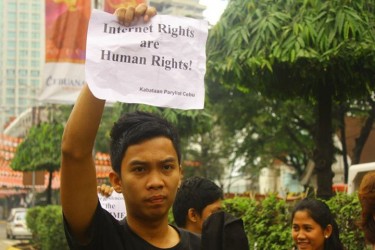Digital rights advocates in the Philippines are gearing up for what could be a transformative period for national-level Internet policy. Within a week of the start of this congressional term, lawmakers had proposed several Internet-related measures that would create strong protections for user rights. This is a welcome development for those who have been working to scrap the country's controversial Cybercrime Prevention Act of 2012 and promote human rights online.
Senator Miriam Defensor Santiago became a leader of the effort when she filed Senate Bill No. 53 or the Magna Carta for Philippine Internet Freedom. The bill will repeal Republic Act 10175, the anti-cybercrime law whose libel provisions were described by Santiago as being vague and overly broad. Santiago emphasized the need to promote constitutional rights in drafting laws that relate to the Internet:
While it is important to crackdown on criminal activities on the internet, protecting constitutional rights like free expression, privacy, and due process should hold a higher place in crafting laws.
Santiago’s bill comprehensively tackles issues of Internet governance, cybercrime protection, digital rights, intellectual property, and access. The counterpart measure in the House of Representatives was filed as House Bill No. 1086 by Rep. Kimi Cojuangco.
Senator Teofisto Guingona III filed Senate Bill No. 73 or the Crowdsourcing Act of 2013 which “seeks to allow wider participation from the public in the legislative process through the use of information and communications technology.” As described in a Senate press release:
…the bill will harness the productive and effective power of social media, as well as allow Filipinos across the country, and even abroad, to participate in the process of law-making.
Crowdsourcing is an expression of the belief that despite our geographical separation, people can still participate in national affairs through the borderless world of the internet.
The bill allows people to comment on pending bills through email and the internet.
Guingona added that “all the comments and all the suggestions (posted online) become official record of the lawmaking process.”
Meanwhile, in the House of Representatives, the Kabataan (Youth) Partylist put forth an Internet freedom agenda for the coming term. Led by Rep. Terry Ridon, the group filed House Bill No. 1100 or Internet Freedom Bill which seeks to promote and protect the rights of Internet users. Ridon concurrently filed House Bill 1132, which repeals the Cybercrime Prevention Act of 2012 in its entirety. Although the Cybercrime Prevention Act is currently under a temporary (but indefinite) restraining order due to concerns about its constitutionality, a successful repeal could kill the bill altogether, making room for strong, user-protective laws such as the Internet Freedom Bill and the aforementioned Magna Carta.
The Internet Freedom Bill would protect specific rights such as universal access to the Internet, freedom of association on the Internet, quality of connection, users’ rights to benefit from what they create, freedom of expression on the Internet, and privacy. The bill also shields users from unwarranted surveillance. It prohibits the following activities:
Monitoring or analyzing of data by an internet service provider without prior knowledge and consent of the user or subscriber.
Internet surveillance and data collection on users by agencies and instrumentalities of the State without securing a court order.
Identification of internet users and disclosure of their communications data without a court order and for purposes other than criminal investigations and criminal proceedings.
Accessing communications data by persons other than public authorities that are directly involved in criminal investigations and criminal proceedings.
The Kabataan party also proposed a third measure, House Bill 1550, or the Free Public Wi-Fi Act, which seeks to provide free wireless Internet access in government offices and other public places. To promote web access, particularly among the low-income groups, the Free Public Wi-Fi Act sets a mandate for the Department of Science and Technology, requiring the agency to provide free Internet connectivity in buildings of all national government offices including regional and satellite offices, municipal halls and provincial capitols, state universities and colleges, public parks and plazas, public hospitals, and even in public transportation terminals such as airports and bus stations.
These measures all fall within the party's stated Internet agenda for the coming term. The party identified five key goals on the agenda:
1. Junking the Cybercrime Prevention Law of 2012
2. Upholding freedom of expression and association on the Internet
3. Universal access to the Internet
4. Improvement of quality of connection
5. Protection of internet privacy
Congress has three years to tackle these measures which hopefully will convince legislators and the Executive that cybercrime is just one of the many issues affecting citizens online. Rather than choosing between Internet-related laws that chiefly promote the interests of government, Congress can now consider measures that protect the rights of Philippine Internet users.
[Disclosure: The author is former representative of the Kabataan Partylist in the 14th and 15th Congress of the Philippines]
Learn more
A Brief Analysis of the Magna Carta for Philippine Internet Freedom, Electronic Frontier Foundation, July 8, 2013
Philippines Offers ‘Enhanced’ Cybercrime Prevention Law, Global Voices Advocacy, June 5, 2013





2 comments